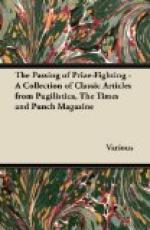The loss of the cakes I could bear stoically enough if they would leave my tea alone, or rather if they would allow me a reasonable amount of sugar for it. However, we are an adaptable people and there are ways in which even the sugar paper-dish menace can be met. My own plan, here offered freely to all my fellow-sufferers, provides an admirable epitome of War and Peace. The sugar allowance being about half what it ought to be, I take half of the cup unsweetened, thus tasting the bitterness of war, and then I put in the sugar and bask in the sunshine of peace.
On this particular occasion peace was on the point of being declared when I found my attention irresistibly compelled by the man sitting opposite to me, the only other occupant of my table. At first I thought of asking him not to stare at me so rudely, and then I found that he was not looking at me but over my shoulder at some object at the end of the room. I can resist the appeal of three hundred people gazing into the sky at the same moment, but the intense concentration of this man was too much for me. I turned round. Seeing nothing unusual I turned back again, but it was too late. My sugar had gone! No trace of it anywhere, except in the bubbles that winked suspiciously on the surface of the miscreant’s tea.
His face did not belong to any of the known criminal types. It was a pale, dreamy, garden-suburb sort of face—a face you couldn’t possibly give in charge, except, perhaps, under the Military Service Acts.
“Do you know,” I said to him, “that you have just committed one of the most terrible offences open to civilised mankind—a crime even worse (Heaven help me if I exaggerate) than trampling on an allotment?”
“Oh, I’m sorry!” he replied, waking from his dream. “Did you want that sugar? You know, you seemed to be getting on very well without it.”
As I could not believe him to be beyond the reach of pity, I explained my method to him, describing as harrowingly as I could the joy of those first few moments after the declaration of peace. I suggested to him that he might sometimes find it useful himself, if ever he should be compelled to sit at an unoccupied table. ("Touche,” he murmured, raising his hat). “And now,” I concluded, “as I have told you my system, perhaps you will tell me yours—not for imitation, but for avoidance.”
“There is very little to tell,” he replied sorrowfully, “but it is tragic enough. All my life I have been fond of sugar. Before the war I took always nine lumps to a cup of tea. (It was my turn to raise my hat.) By a severe course of self-repression I have reduced it to seven, but I cannot get below that. I have given up the attempt. There are a hundred cures for the drink habit; there is not one for the sugar habit. As I cannot repress the desire, I have had to put all my energy into getting hold of sugar. I noticed some time ago that at these restaurants they give the sugar allowance to all customers who ask for tea or coffee, although perhaps twenty per cent. of them do not take sugar at all. It is these people who supply me with the extra sugar I need. In your case it was an honest mistake. I always wait to see if people are proposing to use their sugar before I appropriate it.”




